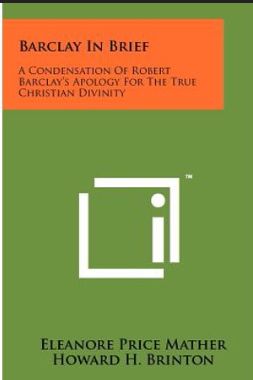An Apology for the True Christian Divinity
by Robert Barclay
Summary
first published in 1678
Robert Barclay (1648-1690) wrote his classic exposition and defense of Quakerism in Latin and published it in 1676 as Theologiæ Vere Christianæ Apologia. He then translated his own book into English. The Apology has since been reprinted over 60 times and translated into several other languages.
Barclay’s education enabled him to understand academic theology. Most early Quaker publicists used a distinctive Quaker vocabulary which was often misunderstood by educated theologians, whom the Quakers misunderstood in turn. Thus in early debate literature, Friends and their opponents often talked past each other, taking the same words in different senses. Barclay bridges this gap, defending Quaker usage while clearly explaining it for the benefit of those who were accustomed to a different vocabulary.
Chapter Content
The First Proposition: Concerning the True Foundation of Knowledge
The Second Proposition: Concerning Immediate Revelation
The Third Proposition: Concerning the Scriptures
The Fourth Proposition: Concerning the Condition of Man in the Fall
The Fifth and Sixth Propositions: Concerning the Universal Redemption by Christ, and also the Saving and Spiritual Light werewith every man is enlightened
The Seventh Proposition: Concerning Justification
The Eighth Proposition: Concerning Perfection
The Ninth Proposition: Concerning Perseverance, and the Possibility of Falling from Grace
The Tenth Proposition: Concerning the Ministry
The Eleventh Proposition: Concerning Worship
The Twelfth Proposition: Concerning Baptism
The Thirteenth Proposition: Concerning the Communion, or participation of the Body and Blood of Christ
The Fourteenth Proposition: Concerning the Power of the Civil Magistrate in Matters purely Religious and pertaining to the Conscience
The Fifteenth Proposition: Concerning Salutations and Recreations, &c.
